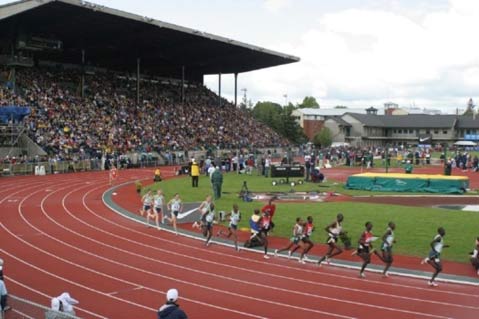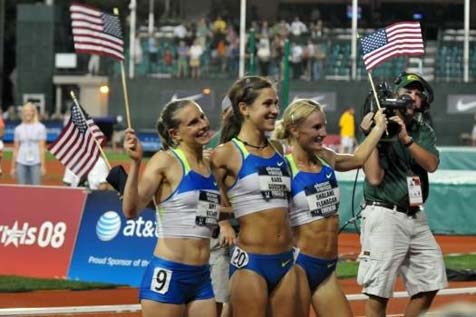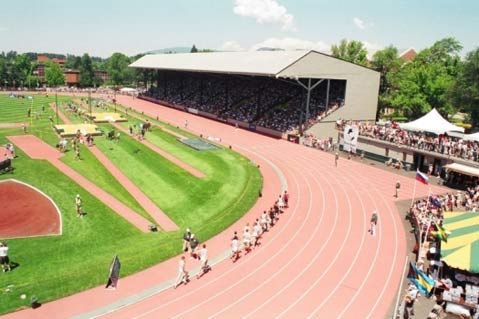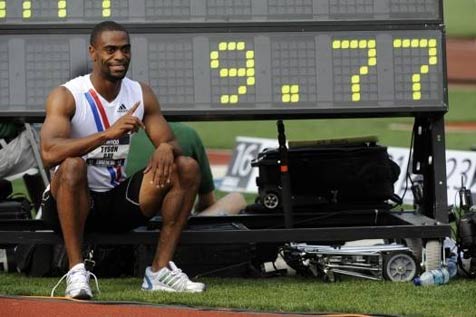America’s Olympic Hopefuls Vie for Beijing in Eugene, Oregon
Following Santa Barbara County's Top Track & Field Athletes on Their Paths to Olympic Glory

I was fortunate to be a daily newspaper correspondent at the last four Summer Olympics – Barcelona, Atlanta, Sydney, and Athens – but I will not be billeting in Beijing this year. To get my quadrennial fix, I did the next best thing – some might say, a better thing – and attended the first four days of the U.S. Olympic Track & Field Trials in Eugene, Oregon.
It was a bit of a journey into nostalgia. I was present at Eugene’s three previous Olympic Trials, in 1972, ’76, and ’80. They were thrilling spectacles because of the intensity of the competition and the passion of the fans – even in 1980, when making the Olympic team was merely symbolic because the U.S. boycotted the Moscow Games.
I wondered if Eugene’s enthusiasm for track and field had dimmed over the years, along with the memory of Steve Prefontaine‘s electrifying races at Hayward Field, the University of Oregon track. “Pre” died in a solo car crash hours after his last race on May 30, 1975. Bill Bowerman, the legendary Oregon coach who introduced the fun-running lifestyle from New Zealand to the Pacific Northwest, creating a jogging boom that spread across the nation, has also passed on. The sport he loved has been dragged through the mud by numerous drug scandals.
On my arrival last Thursday, one of the first things I noticed was that the city is teeming with joggers. They were thick on Pre’s Trail, a wooded path along the Willamette River where the pride of Oregon used to tread. At an amphitheatre on the other side of the river, blues fans nodded and danced throughout a concert featuring Taj Mahal and Keb Mo.
My idea for a song: “The Fourth-Place Blues.” It is a bitterly upsetting condition that will befall athletes who come up one place short of making the U.S. Olympic team. Let the Trials begin.

Friday, June 27
Eugene is pollen country, as I was reminded when I started sneezing. It can be compared to the start of a race: “On your marks (ah-ah-ah-ah) . . . set (aaaaaaah) . . . go (choo)!”
As the Trials got under way, it was evident that Eugene is determined to validate its claim as “Track Town USA.” A capacity crowd of more than 20,000 thronged into Hayward Field on a day when there would be only one final: the women’s 10,000 meters. Every ticket has been sold for all eight days of the Trials – signifying a total attendance exceeding 160,000 in a city not much bigger than Santa Barbara. Several thousand more people showed up at a free outdoor festival next to the stadium, watching the action on big video screens.
Hayward Field has a new look for these Trials: a state-of-the-art track surface, video-enhanced scoreboards at each end of the stadium, and expanded seating. But most the distinctive feature is a familiar one: The sound of the fans clapping rhythmically when jumpers and throwers step up to perform.
“I can feel the crowd,” said Noah Bryant, a shot putter from Santa Barbara.
Bryant, 24, has been progressing steadily from his Carpinteria High days to the top echelon of U.S. throwers. Competing for USC, he won the NCAA championship in 2007. But he faces a powerful trio in the Trials: two-time Olympic silver medalist Adam Nelson, world champion Reese Hoffa, and mountainous Christian Cantwell. All three have heaved the iron ball past 73 feet. Bryant’s best is 67’5 ½”.
Twenty-five throwers lined up to vie for 12 spots in Sunday’s finals. The three favorites qualified easily. Bryant came in ninth with a toss of 64’10 ¾”. “I’m in a good place,” he said hopefully. “I can have fun and just do it. There’s so much pressure on the top three.”
Tetlo Emmen was caught in a quadruple bind. The former UCSB half-miler was in a preliminary heat of the men’s 800 meters that included four runners from the Oregon Track Club. Home-based athletes seem to get an extra boost from the crowd. After a slow first lap, Emmen found himself trailing the Oregon four, and although he ran the final 400 in 53 seconds, he could not get past them. Thus ended Emmen’s brave attempt to achieve Olympic form a year after he was stunned by the death of his father. Duane Solomon of Lompoc and USC had a better ride. The former state prep champion from Cabrillo High qualified for the semifinals in the day’s third fastest time, 1:47.35.
Stephanie Rothstein moved to Eugene last summer after she completed a storied career as a UCSB distance runner, setting Big West records in the women’s 5,000 and 10,000 meters. She has set her sights on the Olympic marathon in 2012. In the meantime, she qualified for the Trials 10,000, and she ran it with her usual determination. “I was picking people off,” said Rothstein, who finished 12th in the field of 24. Her time was 33 minutes, 22.86 seconds.
Thousands cheered the women throughout the race and the victory lap of the first Olympic qualifiers, Shalane Flanagan, Kara Goucher, and Amy Begley. “I’m living the dream,” Rothstein said. She has overcome the anemia problems that beset her at UCSB and has been training under the guidance of Brad Hudson, coach of Olympic marathoner Dathan Ritzenheim. No also-ran blues for Stephanie.

Saturday, June 28
If it wasn’t Track Town, Eugene might be known as Green Town. A block away from Hayward Field, bicycles and skateboards receive valet parking. There are receptacles all over town for recyclables and “compostables,” which include food items, dirty paper plates, and plastic utensils. “You can tell the people from out of town: They throw everything into the trash,” commented a Trials volunteer.
Inside the stadium, things were heating up – literally. The temperature climbed to 96 degrees late in the afternoon, as if the beefy shot putters did not have enough reason to sweat when their hour of reckoning came. Hoffa fouled on his first attempt. Nelson and Cantwell got off subpar throws. But Noah Bryant was unable to take advantage. He opened with a heave of 64’7 ¼” and topped out at 65’10 ½” on his sixth and final throw. In the end, the big boys came through – Hoffa putting 72’6 ¼”, Cantwell 71’2 ¾” – while Nelson’s best of 68’6 ¼” was just good enough. “They’re great athletes, but I should have risen to the occasion,” a disappointed Bryant said. Hoffa, a bear of a man who fancies turkey drumsticks, said he took “a deep breath in relief” after winning the competition. “You know you made one of the hardest teams in the world to make.”

World champion sprinter Tyson Gay had a scare in the opening heats of the 100 meters. He exploded into the lead but, misjudging the finish line, he shut down with 30 meters to go. The rest of the field closed on Gay, who had to rally to finish fourth and move on. Two-and-a-half hours later, in the quarterfinals, a chastened Gay kept the pedal to the metal and streaked across the finish line in 9.77 seconds, a new American record.
The women’s sprinters. who started a day earlier, had a sizzling 100 final. Five of them broke 11 seconds, led by surprise winner Muna Lee in 10.85. Torri Edwards and Lauryn Williams chased her home, the latter admitting with some reluctance that a healthy diet had made her quicker. Said Williams: “Greasy, cheesy, and sweet – that’s me.” The competition was noteworthy for the absence of drama infused into the previous Olympic Trials by Marion Jones, the diva dethroned by doping. “We’ve done a good job stepping into the limelight and giving you something else to talk about,” Williams said.
Hyleas Fountain of Dayton, Ohio, achieved the greatest American performance in the women’s heptathlon since world record holder Jackie Joyner Kersee retired. Hitting five personal bests – including a hurdle time of 12.65 that broke Kersee’s record and a long jump of 22’7″ – Fountain scored 6,667 points. She is the third all-time U.S. performer behind Kersee (7,291 in 1988) and Santa Barbara’s Jane Frederick (6,803 in 1984). “I was bawling like a little baby when I got done,” Fountain said. “I was fourth in 2004. You’d almost rather finish last.”
Sunday, June 29
The first order of business was to find a pub televising the Euro 2008 soccer final. The East 19th Street Cafe, a block from Hayward Field, fit the bill. So did the result: Spain 1, Germany 0. The Spaniards played an attractive, relentlessly attacking style of soccer throughout the tournament, and against the Germans they proved their toughness too. It was their first major championship in 44 years, so they no longer have to refer to “Old Spanish Days” when they talk about their international football success.
My interest in soccer is not shared by the denizens of Track Town. In fact, they point to the growing popularity of soccer as one of the reasons for the decline of interest and participation in their favorite sport. Certainly a player like Fernando Torres, who scored Spain’s goal while beating a defender to the ball and hurdling the goalkeeper, might be a world-class track athlete. In America, however, I’d say that basketball sweeps up more potential sprinters and jumpers than any other sport.
On the track this day, Tyson Gay recorded the number heard ’round the world: 9.68. It was the fastest a human being has ever run 100 meters, although it will not count as a world record because of the aiding wind (4.1 meters per second, twice the allowable limit). Obadele Thompson of Barbados ran a gale-aided 9.69 in 1996. The official world record of 9.72 was set by Jamaica’s towing 6’5″ sprinter Usain Bolt on May 31, a race in which Gay was a rather distant runner-up (9.85).
Coming as it did in his fourth race in two days – a regimen the sprinters will face in the Olympics – Gay’s performance bodes well for his chances in Beijing. “I think it’s going to shake up the world a little bit,” said Darvis Patton. “It’ll make some noise.” Patton (9.84) finished third in the 100 and Randall Dix (9.80) second.
Gay, a sleek but not skinny 6-footer from Arkansas, belies the stereotype of the boastful, trash-talking speed merchant. He prefers to look at his races in an analytical way. He felt his 9.77 on Saturday was superior to the 9.68 because he managed to stay relaxed all the way. “Relaxation is the key to success in track and field,” Gay said.
Leave it to Jon Drummond, known for his chops as a sprint spokesman, to give a flamboyant take on Gay: “Dude needs some re-entry glasses. We need to get some kind of flame-retardant uniform in case he catches on fire, he’s running so fast.” And maybe a parachute to slow him down after he finishes.
Monday, June 30
Oregon’s athletic facilities have been spruced up – the impact of Nike chairman Phil Knight, a UO grad, is seen all over the campus – but not so the fraternity house that was the seedy habitat of the Delts in the 1978 movie Animal House. It has been torn down and replaced by an office building. There is a commemorative plaque at the site where Bluto (John Belushi) and his pals performed various gross acts.
Serious Oregon students would rather project an image of social activism, and to that end, Camp Darfur is set up in the middle of the campus. The temporary settlement calls attention to the genocide in Sudan and China’s complicity in it. But there is no significant movement to boycott the Olympics this time around. In the late Jim Murray‘s words, using sport as a weapon in geopolitical warfare is like throwing “spitwads against a battleship.”
Day Four of the Trials brought more excitement to the home folks. Finishing 1-2-3 in the finals of the men’s 800 were Nicholas Symmonds (1:44.10) of the Oregon Track Club, OU sophomore Andrew Wheating, and the OTC’s Christian Smith, who edged four-time national champion Khadevis Robinson by diving across the finish line. The crowd unleashed the loudest roar of the competition.
Duane Solomon had a rough time of it, finishing sixth in 1:45.78. “I wanted to run up with the leaders, but every time I got close, I’d get spiked or tripped,” he said. Solomon moved outside on the turns to avoid trouble. “I did a lot of work, more than 800 meters worth,” he said. With 200 to go, Solomon was in third. “It was right there in front of my face.” But his energy was flagging, and the runners who had laid back went charging past him. “If it had been a clean race, I would have had a good chance,” Solomon concluded.
Former Dos Pueblos High athlete Kaylene Wagner had a cameo role in the women’s high jump. She went out with three misses at the opening height of 5’10 ½”. She was not surprised. “I’ve been injured all year,” the Kansas State graduate said.
Bryan Clay ended two days of hard labor by piling up 8,832 points in the decathlon. It was 12 more points than he scored winning the silver medal at the 2004 Olympics. And Bernard Legat spurted away to victory in the men’s 5,000 with a big smile on his face, assuring his first appearance as an Olympian in his adopted country.
So ended my first-hand look at the Olympians of 2008 performing at a peak level. I had to agree with Vin Lananna, the Oregon director of track and field who led the effort to bring the Trials back to Eugene: “We hoped to stage the most awe-inspiring track and field meet ever held on U.S. soil. I think it’s going okay.”



